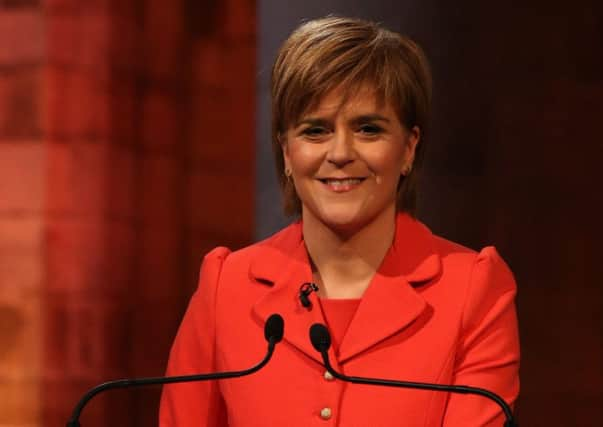Tom Peterkin: TV debating season could be challenging for Sturgeon


In an era where elections and referenda are so thick on the ground, the political TV debate season has become a staple of modern life. It does not have the charm and allure of the opening of the salmon fishing season. Nor does it have the rough and tumble of the football season (although it could teach the SPL a thing or two about blind, tribal loyalties).
Indeed, there must be viewers who despair at their telly schedules being interrupted by these shout-fests.
Advertisement
Hide AdAdvertisement
Hide AdBut for good or ill, they are here to stay and the fixture list offered by the broadcasters ahead of general election 2017 is a fulsome one.
As this televised tradition has developed, the pre-season controversy has become as much a part of the scene as the debates themselves.
This time round is no exception. Before a single jibe has been beamed across our screens, there is already an almighty row about Theresa May’s refusal to take part in these televised occasions.
Given that it is accepted that Mrs May is a shoo-in to return to Number 10 on 8 June, having a series of TV debates without her does seem a bit like organising an Old Firm match minus Celtic.
It is easy to understand why Mrs May is disinclined to take part in these show-piece events. The tightly controlled nature of the campaign she is running suggests she is uncomfortable in situations which might require her to depart from her “strong and stable” script.
No matter how thorough a politician’s preparation, these live events can be a banana skin. Mrs May does not want to expose herself to potential risk.
But her unwillingness to participate is not being viewed kindly by her opponents. Nicola Sturgeon has borrowed from the Alex Salmond lexicon to describe the Prime Minister as “feart”. But with the polls suggesting she is heading back to government, Mrs May has calculated that minimising the risk of a slip-up by refusing to take part outweighs the bad publicity she will receive from not turning up.
Ms Sturgeon, on the other hand, is a confident performer. While these occasions are hardly likely to be entirely comfortable experiences for the protagonists, the SNP leader seems to relish them.
Advertisement
Hide AdAdvertisement
Hide AdTonight will see Ms Sturgeon’s first outing in what is a bit of a bumper season for her. She will be appearing on Scottish debates as well as UK network versions – quite an achievement for someone who is not even standing at the election.
Ms Sturgeon is appearing on what has rather cruelly been nicknamed “the losers’ debate” being screened on ITV at 8pm tonight.
Ostensibly a “Leaders Debate”, Mrs May and Jeremy Corbyn have declined to attend. Therefore, Ms Sturgeon will be alongside Tim Farron of the Lib Dems, Ukip’s Paul Nuttal, Leanne Wood of Plaid Cymru and Caroline Lucas of the Greens.
At the 2015 general election, Nicola Sturgeon was a newly-crowned SNP leader and carried all before her as she out-debated Ed Miliband and out-charmed Nigel Farage. This time round, however, the First Minister may not find things going all her own way.
When appearing on a UK stage two years ago, Ms Sturgeon escaped serious scrutiny on the SNP’s domestic record.
There is unlikely to be such an omission in the run-up to 8 June – particularly when it comes to the BBC’s Scottish leaders’ debate on Sunday and the STV equivalent on Wednesday when her opponents will have a deep understanding of Scottish politics.
But even at a UK level, the short-comings of the Scottish education system are beginning to make an impression on political commentators south of the border.
Furthermore, Ms Sturgeon’s reputation is not at the sky-high levels seen immediately after she took over from Mr Salmond.
Advertisement
Hide AdAdvertisement
Hide AdSince then, the SNP has lost its majority at Holyrood, taking some of the gloss off Ms Sturgeon.
Then, the Brexit vote saw Ms Sturgeon attempt to put a second independence referendum back on the table – a move which has provoked a anti-SNP backlash and profited the Tories.
Recently the SNP has desperately tried to retreat, claiming the general election is about opposing Mrs May’s Tories rather than independence.
Unsurprisingly, her back-pedalling has been in vain. Through her own actions, Ms Sturgeon let the indyref2 genie out of the bottle and it won’t go back in.
There is also the thorny question of EU membership. Ms Sturgeon called a second independence vote on the basis that independence would allow Scotland to retain membership of the bloc. Now, however, the signs are that the SNP recognises the challenges that would present and is exploring an independent Scotland eschewing full EU membership and favouring a half-way house such as the so-called “Norway model” with European Economic Area membership. The Brexit question will also figure highly when it comes to the fishing community’s difficulties with the SNP.
With the fishing industry seeing Brexit as a golden opportunity for the UK to get out of the Commons Fisheries Policy and take control over its waters, the SNP’s pro-EU stance leaves Ms Sturgeon on a sticky wicket.
Ms Sturgeon may still be Scotland’s most dominant politician, but there has been a shift in momentum towards the Conservatives.
All of which means the SNP leader is unlikely to have a repeat of the free run she enjoyed in the past.